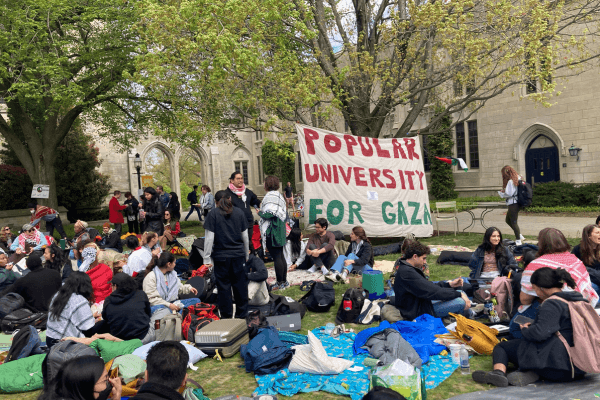Can theater nerds get a witness? This is the age of mass media streaming. Yet, just this past year, 15 million people bought tickets to the 34 odd productions that played on Broadway, braving traffic, steep costs, and long lines to witness live theater. The 73rd Tony Awards were a delightful blessing as James Corden, a producer and award show host this year, chose to highlight the power of human attention and connection, basic elements of the theater world that can serve us all well.
Corden opened with a paean to live theater, gleefully recounting all the ways that sitting in a room with 200 other people, all watching the same thing, has a unique way of forging connection, empathy, and concentrated attention across many divides. The evening’s acceptance speeches, by nominees of a refreshing mixture of ages, ethnicities, and gender, called in audiences and players to pay attention to the beauty and power of people and perspectives that are traditionally deemed unimportant. They communicated advice for anyone seeking to build beloved community and bear witness to something true, speaking of principles like patience, collaboration, teamwork, and fierce hope in something not realized or yet seen.
This year’s Tony’s exhibited a hunger for righteousness, a hunger and belief that the powers and traditions of destruction and death can be fought with an attentive, hopeful love. This desire, for right living, for addressing with story and song the business of living and dying, speaks to a longing we recognize in desiring full resurrection. We want the world to be be made right and whole, person by person.
I appreciate the radical hope of the theater community because perhaps they get what has always been true. It takes holy imagination and a renewal of the mind to wake up to what God is doing to make the world right again. In the theater world, we remember that every person has value and we are diminished when we tell the same, tired story and cut out the same people we want to fashion into easy villains or deem less worthy of attention.
Good theater contains a strain of that gospel antidote, that powerful tradition of trying to name and recognize our demons and human propensities. The earnestness in story that pairs what we believe with what we do, can serve as a way to handle truths about ourselves and our dealings that make us uncomfortable. Often written off as fluffy and as a less effective means of activism, the tradition of plays and musicals has the power to stage an inner confrontation in real time, asking the audience to contend with a hard truth or recasting a social norm we seldom question.
Do you still want to hold to that myth or narrative you’ve swallowed? At the awards show, the company of Beetlejuice offered up a song “The Whole Being Dead Thing”, a reminder that rich or poor, no one makes it out alive. The latest reimagining of Oklahoma! offered up a cast of different hues, shapes, and abilities, slamming the idea that a traditional story only has room for a traditional cast. Cast member Ali Stroker made history as the first disabled woman in a wheelchair to be nominated for and win a Tony. Tarell Alvin Mcraney, introduced his nominated play with an exhortation to faith institutions to not only honor the contributions of black and LGBT Christians who have arranged spirituals, led worship and given their talents to the community, but to honor their bodies as well.
The Prom Musical brought many to tears. This campy, romp show is about a young girl whose prom gets canceled when she wants to bring her girlfriend. She teams up with self-serving, fading actors to build a prom for her and all the other outsiders. The infectious joy, hope, and insistence in the lyrics that it is possible for flawed and hurting people to build a prom/ for everyone/show the world/ it can be done/ spoke to a larger truth: sometimes we don’t even know what is possible or what could change until we just do it.
To paraphrase winning director Rachel Chavkin: Sometimes, we just need to be reminded that in the fight of our lives, we must reject the lie that we go alone and that the present darkness is the final story. The good news is knowing that in every season the Resurrection continually can make all things, including each of our connected stories, new.
Got something to say about what you're reading? We value your feedback!








